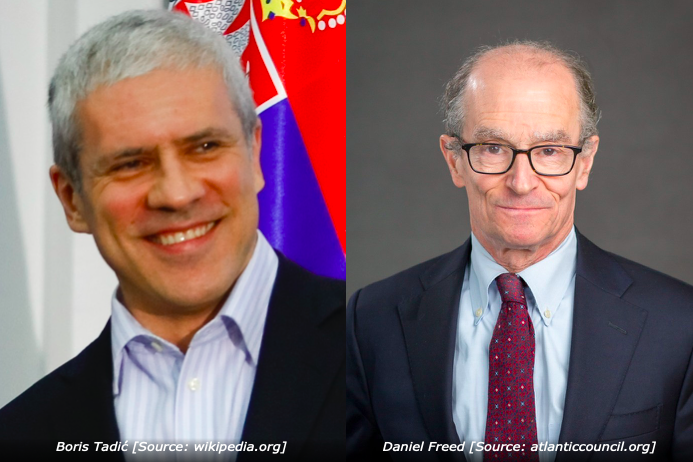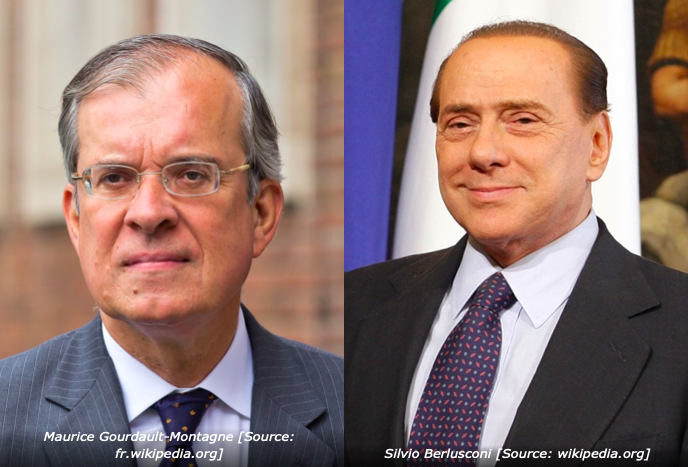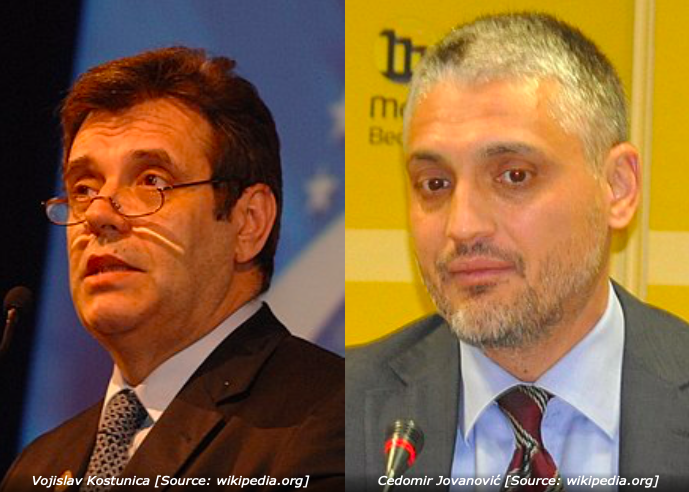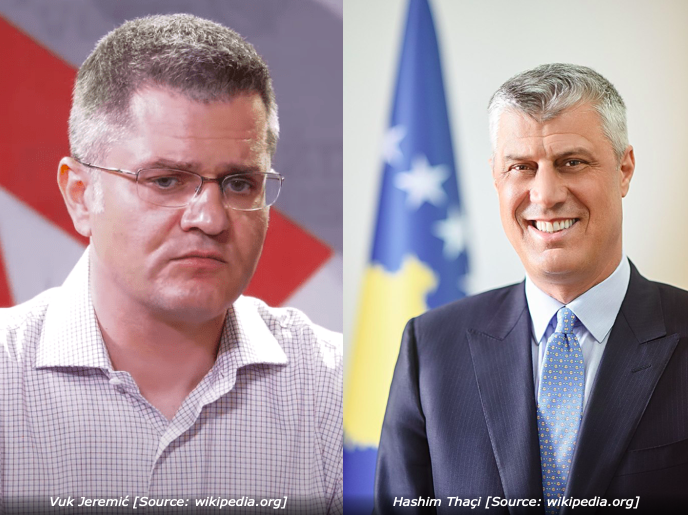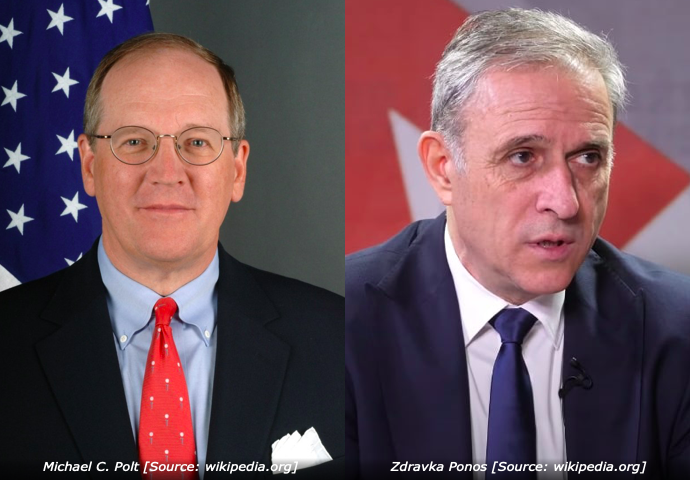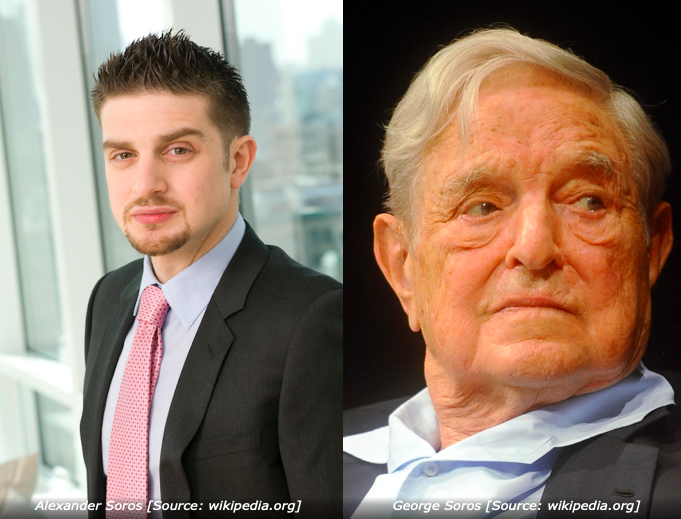Wikileaks Cables Detail U.S. Campaign to Engineer Kosovo’s Independence and Destabilize the Balkans
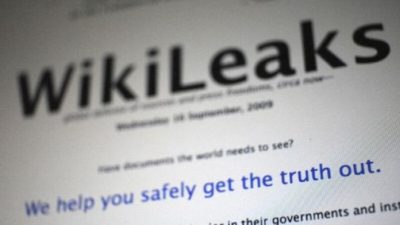
All Global Research articles can be read in 51 languages by activating the Translate Website button below the author’s name.
To receive Global Research’s Daily Newsletter (selected articles), click here.
Click the share button above to email/forward this article to your friends and colleagues. Follow us on Instagram and Twitter and subscribe to our Telegram Channel. Feel free to repost and share widely Global Research articles.
***
Fears about a revival of the 1990s’ Balkans conflict have resulted from the flaring of renewed tensions between Serbia and Kosovo. Time magazine reported that, in May, Kosovo police raided Serb-dominated areas in the region’s north and seized local municipal buildings. Further, Kosovo’s police and NATO-led peacekeepers engaged local Serbs in clashes that led to dozens of people being injured on both sides.
Traditionally, Kosovo was a province of Serbia but declared its illegal, unconstitutional, unilateral, pseudo independence in 2008 with U.S.-NATO backing—nine years after a U.S.-NATO bombing campaign targeted the Serbs that helped establish ethnic Albanian rule in Kosovo.
New reports prepared by U.S. diplomats which were released by WikiLeaks and the British Guardian in 2010 uncovered the details of how the Western powers used all diplomatic ways and means to try to engineer the independence of Kosovo and get support for that from Russia. Certain cables by Western diplomats reveal how France and the U.S. had tried to maneuver so that Serbia could get the Agreement for Stabilization and EU Accession (SAA) as well as NATO membership in the Partnership for Peace.
The diplomatic correspondence cables by the U.S. Ambassador to France, Craig Stapleton, written on December 12, 2006, detail a conversation between Daniel Freed, the Assistant to the U.S. Secretary of State for Europe and Eurasia with Maurice Gourdault-Montagne, foreign policy adviser to then-French President Jacques Chirac, held on December 7, 2006, in Paris, France.
The French president’s adviser talked then about the plans by France to convince the EU to offer Serbia membership in SAA designed to get it into the EU, regardless of the unfinished obligation of full cooperation with The Hague Tribunal. They were worried about the explicit threats by then-Russian President Vladimir Putin that he would veto the UN Security Council resolution on the Kosovo issue.
In the cable, which was marked as secret, it is relayed that Freed said that the West should prepare themselves to act without the Russians, and that the U.S. decided to offer Serbia Partnership for Peace (prelude to NATO membership) as well as the support for democratic forces within the country on the eve of the elections and that President Boris Tadić created a good foundation for a Euro-Atlantic future for Serbia.
According to the WikiLeaks cables, the U.S. decided for the same reasons to support the postponement of Ahtisaari recommendations on the status of Kosovo (recommendations by President of Finland Martti Ahtisaari for Kosovo’s independence with supervision by the international community), after January 21, 2007, when extraordinary parliamentary elections were held in Serbia.
What was certain was that the Russians were not to be allowed to believe that the veto threat would work because they would make use of it. The West thus should send a signal that they were ready to move without them if necessary, because the non-existence of a signal would be interpreted as a tacit agreement for Russia to raise their stake. “That would be a horrible possibility, but the paralysis would be worse,” Freed said.
Maurice Gourdault-Montagne said that President Chirac recommended to German Chancellor Angela Merkel that the EU offer to Serbia becoming part of the SAA even in the case of insufficient cooperation of Belgrade with The Hague.
Merkel first gave a negative response, stating Tadić’s failure to fulfill it, but France still considered that the offer of SSP could make a difference in the January elections. Gourdault-Montagne added that France would then offer SSP on its own.
However, in the WikiLeaks cables of other U.S. diplomats who discuss the issue of Kosovo, it is mentioned that the U.S. Ambassador to Italy communicated to the State Department in Washington that Italian Prime Minister Silvio Berlusconi said, in November 2008, that the recognition of the independence of Kosovo represents a U.S. provocation against Russia.
The Kosovo issue is mentioned in the WikiLeaks cables related to Georgia as well. In June 2007, Georgian President Mikheil Saakashvili expressed his concern that the independence of Kosovo could create a precedent and encourage the position of Russia in the breakaway Georgian territories of Abkhazia and South Ossetia.
The State Department documents published by WikiLeaks emphasize that Undersecretary of State for Political Affairs (and future CIA Director) William J. Burns met with Saakashvili in June 2007 in order to confirm the intention of the U.S. to support the independence of Kosovo.
However, Saakashvili warned the U.S. on that occasion that Russia would use that precedent to recognize the independence of Abkhazia. This conclusion could be drawn from a confidential cable sent to the U.S. Embassy in Paris.
Burns responded that the recognition of Abkhazia would isolate Russia on the international stage and would call upon Georgia to refrain from opposing it. According to this cable, the U.S. diplomat told Mikheil Saakashvili that then-U.S. President George W. Bush, at the G8 summit, told Putin clearly that Kosovo would be independent.
Russian threats that they would recognize Abkhazia were evaluated by Burns as vacuous, adding that then-Secretary of State Condoleezza Rice clearly told Putin and Sergey Lavrov that the recognition of Abkhazia would be a great mistake.
When asked by Saakashvili if there were anything else besides Abkhazia which Russia would accept in return for the independence of Kosovo, Burns responded that the U.S. was searching for a solution as to how to encourage the Russians to refrain from the Albanian negotiations for three to five months more.
In the cables which were published by WikiLeaks, separate meetings were mentioned with the then outgoing U.S. Ambassador to Russia, William Burns, in which opposition to Kosovo’s independence was voiced by Soviet dissident Aleksandr Solzhenitsyn and Patriarch Cyril.
Solzhenitsyn repeated his criticism to the Ambassador about the independence of Kosovo. Why would the Serbs, he asked, be responsible for the sins committed by Milosevic?
As was detailed in the cables, Solzhenitsyn was also critical of that decision and plans about Ukraine getting closer to joining NATO.
*
Below is an interview carried out by Serbian TV on the talk show Govornica with Nikola Vrzić, who is author of the book WikiLeaks Serbia, which provides further details on the significance of the WikiLeaks Serbia documents.
TV host: The exposure of the network of U.S. influence in Serbia, for which it seems to me that before you published your first book was merely guessed at by many locals, and that it may have been somewhat incidental, there have been mere suspicions of what may have been happening. And then we have the situation that in the year 2011 you obtain full access to….
NV: Not only me. All the reporters in the world. When WikiLeaks were released…
TV host: In the autumn of 2010, WikiLeaks published diplomatic correspondence and I am interested to know who remembered to use the somewhat antiquated term depeša(cables). Yet, it is in fact diplomatic correspondence and cables sent by a telegraph. You selected 1,000 out of 250,000 diplomatic cables sent from Belgrade [Serbia] and several hundred sent by others which were related to Serbia.
NV: Yes, that is true.
TV host: You come to a conclusion, with which we shall wrap up this talk, that a very powerful and incredibly strong network of U.S. influencers in Serbia has been established, which penetrates almost all pores of a society, given that the U.S. has their own insiders not only in the government ministers, who duly report to them, and not only in the military where they “assign” generals, and not only within the Serbian Orthodox Church, the Serbian judicial system or the Public Prosecution and political parties but also they weigh in in the creation of the political coalitions. What we have today can be viewed as the result of the U.S. influence which anybody [can see] who takes a look at the book you wrote in 2011, published by PECAT in as few as a hundred pages, the title of which is…
NV: WIKILEAKS: The Secrets of the Belgrade Political Correspondence
TV host: And I think there is an alternative title which you did not assign to it eventually. It sounded something like “The chronicles of the occupation” or something along those lines.
NV: Well, yes. In fact you have described it all fine. It seems that these cables are the reports which the U.S. diplomats sent off; these were the conversations with our politicians though retold.
TV host: The reports by ambassadors and diplomatic civil servants/officials from Belgrade sent to Washington, D.C.?
NV: Yes. That is true. Then there are reports about a set of “counsel” sessions of the U.S. diplomats with their allies related to Serbia. I used everything that would give me a broader picture of Serbia in that context.
TV host: So the time span it covered was from 2005 to 2010. Is that so? The U.S. ambassador at the time was…
NV: There was Michael Polt, then Cameron Munter, then Jennifer Brush afterwards…I am not sure if I may have forgotten somebody…So, it was not only one U.S. ambassador [but a number of them in succession]. We also have the cables from Hillary Clinton who signed and sent them in her position as Secretary of State back then. Anyways…the point of all this is, at the end of the day, the Americans at least in that period, the crux of the matter was/is Kosovo and Metohija and how to force Serbia into formally renouncing Kosovo and Metohija and how to find appropriately cooperative “allies”[1] to help them with that. I asked Vojislav Kostunica to give a talk at my book promotion because he was our Prime Minister at the time. He has proven to be a man who can truly look us in the eyes[2] because he never resorted to any falsehoods or lies and he never reneged on what he would pledge in public.
TV host: I am now chuckling because I remember your statement and I would like to ask you now to explain it to our TV viewers. It refers to Vojislav Kostunica. According to the secret reports from the U.S. Embassy in Belgrade, only two Serbian politicians were considered to be truly consistent: Vojislav Kostunica and Cedomir Jovanovic.
NV: Yes, that is true.
TV host: Could you possibly explain?
NV: Vojislav Kostunica is consistent in his advocating for…
TV host: How is it possible that all the others are believed to be dishonest, lying and conniving, yet only Cedomir Jovanović and Kostunica are consistent in your opinion?
NV: Of course. I told this tongue-in-cheek. Kostunica has been consistent in his protecting or at least in his efforts to protect and defend [our sovereignty and Constitution, etc.]. He was consistent in that he never retreated an inch “from the red lines drawn” which were stipulated by our Constitution and Resolution 1244. Cedomir Jovanovic, on the other hand, of course, he has been “consistent” in a completely different way. We do not have to dwell on “his personality” for too long in vain.
TV host: Is that also consistency when we talk about Cedomir Jovanovic?
NV: If high treason were a matter of honesty, yes.[3] Yes, it can be called consistency. There was an issue with Boris Tadić, Vuk Jeremić and Zdravko Ponos and “their cronies” all the time, according to the reports by U.S. diplomats…What I am doing in my book is making a cross-section of the information stated in public after a number of meetings in certain situations with what we found out from what was written in the U.S. WikiLeaks. So what we have here is Vuk Jeremić and Boris Tadić saying that Serbia is militarily neutral but they had just come out of the NATO meeting where, according to the U.S. diplomatic reports, both said: “Our no. 1 priority is for Serbia to join NATO.” Then in the WikiLeaks we can further follow their joint synchronized “work” on the proclamation of the quasi “independence” of Kosovo, i.e., you mean how can Kosovo proclaim independence unilaterally because it was not possible otherwise[4] but to avert the political demise of Boris Tadić, though for that “incident” not to impede the ongoing election campaign?
NV: Yes, exactly that. For that reason, Vuk Jeremić facilitated the introduction of Hashim Thaçi into the UN Security Council which had not been possible before.
NV: Yes, but because of the TV broadcast and Tadić’s speech in the UN Security Council, Vuk Jeremić did that.
TV host: I need to ask you this: Serbia had “its (un)fair share” in “the declaration of Kosovo independence” up to a point in such a way that it does not hinder President Tadić’s presidential elections
NV: Essentially yes. Some sort of a deal was along these lines: “Could you please ‘keep schtumm’ for now until the elections are finished for Boris Tadić to win in January 2008, and after that you declare independence and we shall do nothing that crucial, i.e., ‘we shall reduce our reaction to mere cosmetics.’” So this was exactly what happened. In the meantime, we went through some rather nasty episodes. For instance, the Serbian government…because we already knew what was being prepared “in the pipeline,” rejected the Ahtisaari plan. We did not want to take part in it. We did not have any mechanism to put a halt to it, i.e., to prevent the U.S. and those in Pristina from declaring independence but the Serbian government, the leader of which was Vojislav Kostunica, although DS had a parliamentary majority at the time, they prepared a plan of action then.
TV host: Yes, the famous “secret measures.”
NV: That plan was classified as a “state secret.” Then Borko Stefanović goes to the U.S. Embassy and carelessly babbles out the details of that plan.
TV host: Please, let me stop you there. If a person discloses a state secret according to our legislation, it is stipulated in our Constitution that the person should face a prison sentence of one to ten years.
NV: I did not check that piece of information myself.
TV host: I did. Since I found that detail in your writings. How is it possible for you to publish written American evidence that a high government official who was the Cabinet Chief…?
NV: I was running the risk of being seriously sued for a most severe case of defamation…
TV host: Borko Stefanović…He in fact should be indicted for disclosing a state secret which is a severely punishable criminal offense by our criminal law. That is one thing. Another thing is, these people…
NV: We can get back to our conclusion that this is some sort of a silent occupation in which the Public Prosecution driven into a political corner and they cannot do much. Look at how the legal proceedings against Momcilo Perisić is being delayed forever. I seem to be jumping from one topic to another but…What [on Earth] has happened to that trial?
TV Host: You use colorful expressions in your book in saying that you have caught a group of people “red handed” more or less, the result of which is absolute silence [i.e., media blackout]; I am rather well-informed but I found out about the WikiLeaks in 2017, which is six years afterwards. It might be because I am not reading the newspapers attentively but it is also possible that the existence of that book has been “carefully concealed” from us,[5]so as to prevent us from finding out that “they,”[6] for instance, “indirectly” “elect” our Serbian Orthodox Church Patriarch?
NV: Yes, yes. The U.S. directly together with the DS [Serbian Democratic Party] who tried to influence the election of the then-Patriarch, they engaged in political scheming within the Serbian Orthodox Church inside out, hoping they would find somebody who would be “flexible” enough again in relation to Kosovo and Metohija. As I have said, that issue is more or less the only one within the scope of their interests, complete with Serbia gradually joining NATO. All these alleged “reforms,”[7] within the Serbian Army have served that purpose which has paradoxically boiled down to Serbian Army “disarmament.”
Simply, the atmosphere was such. Why was it kept “under the radar”? All these details are still fresh in my mind. So, these cables have started to emerge. There is a huge number of them, about four million and even more than that. All the world media wrote about it. WikiLeaks have put it all online little by little, “drop by drop” on their website. Media were following it closely because that was breaking news at the time. But there were no cables whatsoever related to Serbia at the beginning. When WikiLeaks released all of it, it was made available for each and every journalist to see. I was not the only one who could access these.
Of course I do not believe that anybody from another part of the world might be interested in what is going on in Serbia on a political front, though really it was a real bonanza, to my mind. How often is there a chance to gain access to what was happening earlier on the basis of correspondence from officials of the most powerful country in the world? It was a golden opportunity indeed. All of a sudden there was utmost silence in the Serbian media. I wrote a few articles about it for Pecat. I was scouring through all of those feverishly round the clock, looking for those pieces of news related to Serbia intriguing enough to place them in a broader context, etc. At that point I realized that publishing a book would be a better solution as soon as possible. That was the reason why I did not cover some chapters, which would have dealt with the South Stream, which is an intriguing story as such, and about Republika Srpska, etc. Some relevant political issues were not covered in the book but I did write about the “de-sovereign-ization”[8] of Serbia.
TV host: You mean “the total demolition of the sovereign state and placing it under the U.S. control”?
NV: It was a clear case of political engineering. Their participation in demolishing the Serbian Narodna Stranka, the participation of Boris Tadić’s Cabinet in the continuation of the work of Srpska Napredna Stranka, the complete change in the political mindset of SPS and Ivica Dacić, an attempt of a coup within the DSS party, which they failed at, but then Kostunica was “dispensed with” in a different way. So, a complete political engineering was performed by the U.S.[9]
TV host: You have not mentioned the election of the Chief of the Serbian Military Headquarters. That was one of the most devastating pieces of information.
NV: Michael Polt, the then-U.S. Ambassador kept insisting that Zdravko Ponos be nominated as the Chief of the Serbian Military headquarters in Kostunica’s government, though his approval in the capacity of the President of the government was not needed at all; they wanted to maintain very good relations between PM Kostunica and President Tadić [10] at the time.
TV host: So an ambassador of a foreign military power, which fought an illegal war against our country, in 1999, determines, or shall I put it differently, is making an enormous effort to “influence” the nomination of the Chief of the Military Headquarters? And on top of that, he is “pushing” the name of Zdravko Ponos and he is lobbying for him directly?
NV: Kostunica was quoted in one of the WikiLeaks cables in which he addresses the Ambassador with the following words: “It is interesting that you know more about him than I do.” This is a rather telling detail. Of course, Zdravko Ponos became the Chief of the Serbian Military General HQs whereas Dragan Sutanovac became Minister of Defense and all the NATO courses at the NATO airbase in Geilenkirchen, Germany, for them followed. Let me get back to something I said earlier. On one hand, we have a worrying continuity in the ever-deepening cooperation with NATO between the previous and the current government. We see there the official Serbia had kept promising that Serbia would one day join NATO. Unfortunately, we do not have that sort of a “gateway” to be able to see what they might be doing now.
TV host: I prepared that as a separate question for you. Please, go on.
NV: Let us be straightforward. We have to acknowledge that the Serbian military has since been consolidated indeed in the recent period. Much more than it used to be. So, some aspects are being restructured and renewed. We can see in the report by the U.S. Congress that there is a serious suspicion related to what is happening in the Serbian military compared to the year 2012. The report related specifically to Serbia was requested from the U.S. military budget in comparison with the cooperation with Russia from 2012 up until now. So these are some objective indicators that our military resources are being replenished and it would not be fair to remain silent about this fact.
TV host: I could make a lengthy list of all the statements of the current President of Serbia, which turned out not to be true later. I am afraid that this detail about the renewal of our military equipment might be simply…something for which the reasons might be rather different either dishonest or with false motives.
NV: As I have said already, the U.S. Congress asked for the U.S. military budget by the Pentagon for these details to be presented related to all that has been done. These are U.S. data and surely not based on hearsay by the locals [in Serbia].
TV host: You quoted Vuk Jeremić in your book a few times. You claim that you have a lot of reasons to be suspicious of his “patriotism,” i.e., that his integrity was practically challenged with the mention of his name in WikiLeaks. I am sorry for interrupting you.
NV: Yes, that is true. As for Vuk Jeremić, the situation is rather simple. He should be representing a patriotic image of the [Serbian] Democratic Party[11] at that moment and there is another episode there which speaks volumes…one of the U.S. reports elaborates on the fact that Vuk Jeremić gave some sort of a speech, an inflammatory anti-U.S. speech, but when the speech was over, he approached the U.S. Embassy official, who was sitting in the audience, only to express his apologies for his inflammatory speech, because he said he had to do it that way for purposes of his presidential election campaign.
One can only feel ridicule or mild disgust at hearing this. There were more serious issues there for example: the acceptance of EULEX mission which was stipulated by the Ahtisaari Plan, the primary purpose of which was to create an independent state of Kosovo. The Europeans were not ready to send such a mission to Kosovo if Serbia was against it. One could see that in the WikiLeaks [documents]. Serbia was completely aware of it and said yes. All of that was camouflaged into UN Six-Point Plan for EULEX, i.e., that six-point plan by Ban Ki- Moon, which was non-existent in effect. Then we had a ridiculous episode with the withdrawal of the Serbian Ambassador to Montenegro, when Montenegro recognized Kosovo’s independence so we in Serbia decided to expel their ambassador, though he explained this tactic was merely put in place because we needed to appease the public outrage for the time being. Everything would soon return to normal [i.e., they would get the ambassador back in the embassy shortly afterwards].
TV host: You are bringing examples of political hypocrisy to our attention. You are aware that we have mentioned here unintentionally…I personally did not know that we would mention these names, that we have mentioned the President and the Vice President of one of the latest opposition parties in the formation of the Narodna Stranka, Zdravko Ponos is the Vice President. Vuk Jeremić is the President of the party for which it turns out on the basis of the WikiLeaks that we have the reasons to doubt their honesty.
At the same time, I do not wish to sound as if I were talking in favor of President Aleksandar Vucić. I should avoid sounding like that. I would like to remind everybody that anybody who reads Pecat most probably knows that, in a recent issue, I published an article, “Soros’s Plan for Kosovo,” in which I elaborated on what Vucić persists at, unless he has given up on it in the meantime, on the “razgranicenje” [the territorial dividing line/administrative line) and the division of Kosovo is not only that it is catastrophic for Serbia for a number of reasons, but it is the fruit of “his unscrupulous arrangements” with Alexander Soros, George Soros’s son, who is obviously taking over his father’s businesses.
Alexander Soros met up with Hashim Thaçi for further talks. Then again this is not based on just hearsay. All of this is presented on Soros Jr.’s Instagram profile and all the announcements by the Serbian government. So, it was written in an official press release that Alexander Soros was visiting at the beginning of this year.
It is stated that they talked about ways to improve and expand the number of international recognitions of Kosovo and then he had several meetings with President Vucić. Their most recent meeting happened a couple of weeks ago in which Vucić, upon the announcement by the Serbian government, thanked Mr. Soros for the plan which was created and presented to our public which takes the division of Kosovo and the territorial exchange for granted as the most preferred outcome for Serbia; which is in effect Soros’s plan for Serbia.
*
Note to readers: Please click the share button above. Follow us on Instagram and Twitter and subscribe to our Telegram Channel. Feel free to repost and share widely Global Research articles.
Olga Peterson is a writer and translator living in Serbia.
Sources
Part of this article for CAM is a translation of a television program where Nikola Vrzić was invited as a guest to talk about his book.
https://www.pecat.co.rs/2011/09/vikiliks-tadicev-kraj-kosovske-igre/
https://www.pecat.co.rs/2018/10/ahtisari-posle-ahtisarija/
https://www.pecat.co.rs/2011/09/vikiliks-americke-depese-i-srpska-politicka-kaljuga/
https://www.politika.rs/scc/clanak/158529/Vikiliks-otkrio-depese-o-Srbiji-i-Kosovu
Notes
-
Translator’s note: insiders, the Fifth column
- Translator’s note: with his own personal unquestionable integrity
- Translator’s note: This is a sarcastic comment.
- Translator’s note: It is not possible legally or constitutionally.
- Translator’s note: from us reporters
- Translator’s note: they (the Deep State)
- Translator’s note: alleged, bogus reforms
- The term dedrzavizacija was used in the book; it translates as “de-sovereign-ization” of Serbia.
- Translator’s note: NATO and CIA infiltrating the national system completely
- The Serbian political system stipulates that Serbia has both President and PM Prime Minister at the same time plus the government ministers.
-
Vuk Jeremić used to be a member of [the Serbian] Democratic Party but he was later formally expelled so he set up his own political party, Narodna Stranka.


